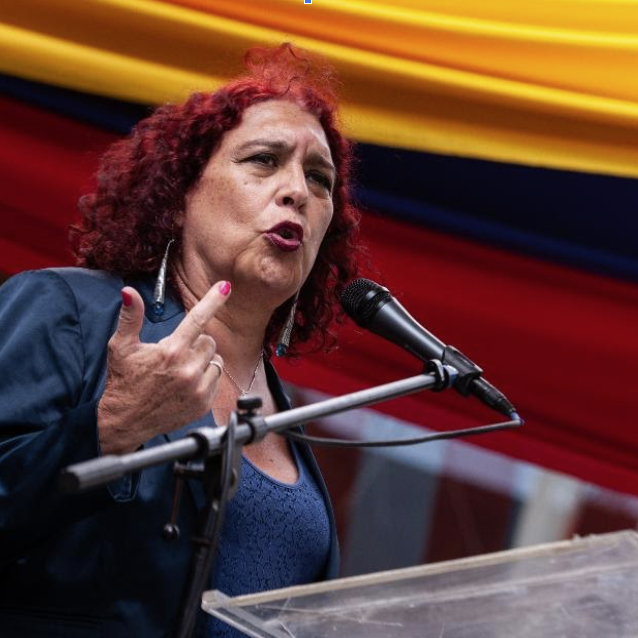How did you initially become involved with activism and policy change?
I have known since I was four-years-old that I am transgender. Later in life, after returning from law school in Paris and experiencing the benefits of the patriarchy as a heterosexual middle-class man, I began transitioning in the late 1980s. Once I began transitioning, for the first time in my life I felt discrimination, bias, and exclusion. This propelled me to fight against the deeply-rooted discrimination towards women and the LGBTIQ+ community by joining civil society organizations and engaging in politics. In 2002 I completed my gender affirmation surgery while authoring articles about the totalitarian regime gaining power in Venezuela and joining the United Nations Committee of Human Rights. Eventually, Leopoldo López from the Voluntad Popular political party encouraged me to run for office and through a subsequent election I was elected to the Venezuelan National Assembly on January 14, 2015.
Have you seen how the totalitarian regime directly affects LGBTIQ+ individuals?
Bias, prejudice, and manipulation with militaries in power is a perfect cocktail for intolerance. LGBTIQ+ individuals are politically excluded. When Chávez came to power, the Venezuelan Constitution was re-written. The resulting constitution ignored any proposed progressive changes with regard to LGBT issues, refusing to recognize sexual orientation or gender identity. In 2003 I filed a petition of interpretation in hopes to receive recognition of my gender identity. This petition wasn’t addressed until 2008, in which it was even further changed to reverse the clause on civil unions, with extreme reasoning such as marriage was in danger, in need to be super protected and that same-sex couples were so different from heterosexual couples that they could not be discriminated against.
As discriminatory rulings moved forward in Venezuela, several other Latin American countries advanced progressive LGBTIQ+ policy. Before Venezuela’s judiciary system was co-opted by the Chávez administration, more than 150 transgender people were granted gender identity recognition from 1977 to 1998. The totalitarian regime switched out past judges for those who were pro-Chávez and religiously motivated. From 2000 to the present, all gender and name change request cases have been dismissed, my case has been ignored for 16 years. Replicating a 2002 lower court decision, Venezuelan judges continue to rule that gender affirmation surgeries are against the law. Even without any reference to an existing law, these unjust rulings have been upheld.
What are some policy changes that you’ve been working on?
Through acts of the Maduro Administration and judicial system, the Venezuelan National Assembly has been put in a state of legislative paralysis for the past four years. In 2016 I introduced an Act to Amend the Organic Law of Civil Registration. This act included reestablishing common law (specifically civil union) marriage, rights of transgender people to be legally recognized in their gender identity within the civil registry without pathologization, and created an intersex birth certification that addressed nonconsensual surgeries of newborns.
I persevered and introduced an amendment earlier this year which established the recent definition of marriage by the Inter-American Court of Human Rights in Venezuela and allowed name changes for individuals. This amendment along with the original act has not been passed.
Because it is so difficult to change policy, what are some other avenues you’ve used to facilitate change?
Stonewall Foundation helped fund a survey initiative I led which included responses from LGBTIQ+ Venezuelans: 300 individuals living within the country and 300 individuals abroad. This survey examined an extensive number of aspects, from living conditions to verbal and physical violence, to religious participation. One of the findings that surprised me was related to physical violence within the family. In the majority of cases the main aggressor was a mother, with only 30% of cases referencing a father. Venezuelans abroad shared that violence and discrimination has decreased considerably, with almost 90% reporting a drop since they left their home country.
The data from this survey is critical when examining how deeply rooted discrimination against LGBTIQ+ individuals is in Venezuela and can be a data resource in the future to support necessary changes to law and policy.
What is most important for readers to know about LGBTIQ+ issues in Venezuela?
This is not a revolution. All people have been deprived of their basic rights and the economy is destroyed with inflation and hunger rampant – poverty being more extreme for LGBTIQ+ individuals who don’t have access to proper identification. Over 6.5 million Venezuelans have left the city of Caracas and 1.8 million Venezuelans have fled the country to neighboring Colombia, some facing guerillas and sexual slavery along the way.
During my time in the National Assembly, 48 fellow members of parliament have fled abroad, eight have been put in jail, and three colleagues detained in their homes. Leopoldo López, the head of the Voluntad Popular party has been a target of fraudulent convictions and detainment over the past two decades, finally fleeing Venezuela in October 2020. Recently a prominent gay journalist and activist, Roland Carreño, was also detained and dissapeared for several days before being falsely incriminated and depicted as a threat to society in the Cadena Nacional.
In addition to detainments and imprisonments of LGBTIQ+ Venezuelans, on December 6, 2020 there was a fraudulent election implemented by Maduro in which the democratically-elected National Assembly was undermined. While there is no magical solution, I am realistic, deeply frustrated, but hopeful. International pressure is necessary and united towards positive change we can win.

